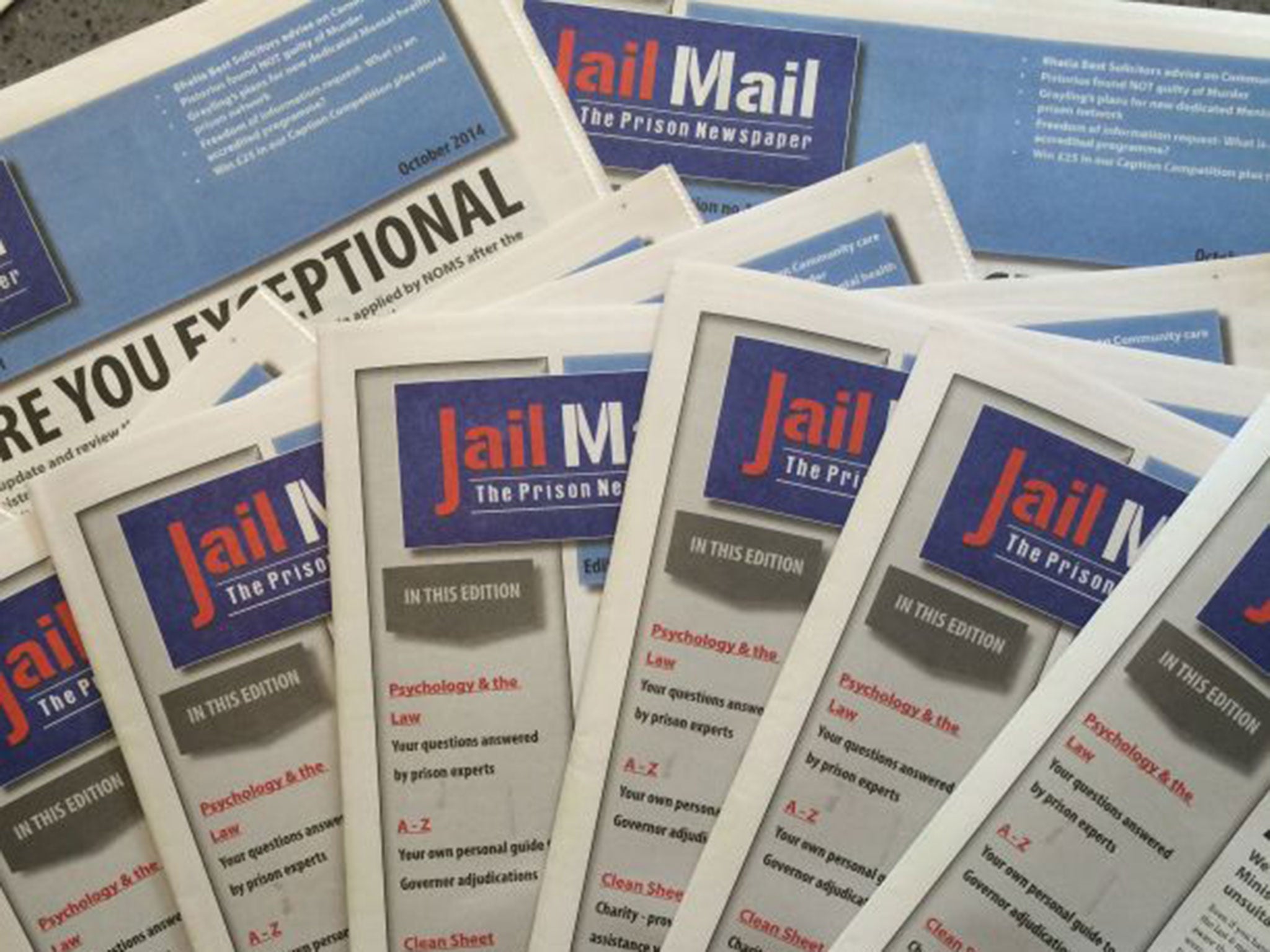Jail Mail is a national newspaper with a difference – it's only available in prisons
Britain's third national newspaper for prisoners launched this month. Ian Burrell explores how it compares with previous titles in reporting the news behind bars

Your support helps us to tell the story
From reproductive rights to climate change to Big Tech, The Independent is on the ground when the story is developing. Whether it's investigating the financials of Elon Musk's pro-Trump PAC or producing our latest documentary, 'The A Word', which shines a light on the American women fighting for reproductive rights, we know how important it is to parse out the facts from the messaging.
At such a critical moment in US history, we need reporters on the ground. Your donation allows us to keep sending journalists to speak to both sides of the story.
The Independent is trusted by Americans across the entire political spectrum. And unlike many other quality news outlets, we choose not to lock Americans out of our reporting and analysis with paywalls. We believe quality journalism should be available to everyone, paid for by those who can afford it.
Your support makes all the difference.Stand aside Jamie Oliver, there's a new media chef on the block. By which I mean prison block. Ross Bell, serving an eight-stretch for VAT fraud, has been waxing lyrical about his latest culinary creations. All prepared in the kitchen of HMP Mount.
Bell's journalism – he describes prepping his ingredients with a small knife "chained to the wall with a thick metal cable" – is part of a range of media being delivered to the 85,625-strong prison population of England and Wales.
Earlier this month, Jail Mail became the third national newspaper in the prison system, following Inside Time and Converse. It had such an enthusiastic response to its first edition – containing advice such as what to do when you're up before the governor – that it is doubling the print run to 20,000 next month.
Jail Mail is produced by the Nottingham consultant solicitor Stephen Luke who says: "It's a paper for prisoners to provide information and help them through their sentence." It includes details of a prison fiction-reading project and advice on finding employment after release. It is largely funded by advertising from solicitors looking for business from inmates.
Luke, who specialises in advising prisoners facing the parole board, said that his first edition had attracted hundreds of letters from inmates.
That prisoners like to write for newspapers has long been clear – and not just to students of Oscar Wilde. Inside Time was launched with the help of the veteran jail reformer Lord Longford in 1990 in the wake of the Strangeways riot in Manchester. Eric McGraw, then director of the New Bridge charity, acted on a recommendation from Lord Woolf's riot inquiry and created a prisoners' newspaper to help inmates express their concerns.
Nearly a quarter of a century later it has a distribution of 60,000 and produces an annual collection of verse, Inside Poetry. The Justice Secretary, Chris Grayling, would possibly be less than enchanted by an ode in the current edition, "Mr Grizzly Grayling", from the pen of HMP Garth inmate Peter Howell. "The inmates ask when will it stop/not till Grayling gets the chop."
One of Inside Time's four co-editors, Noel "Razor" Smith, honed his literary skills in angry missives and rhyming couplets sent to the paper while serving time for armed robbery. He became a published author while in prison and wrote a second book after his release in 2010. His fellow co-editor John Roberts said the appetite of prisoners for poetry had come as a surprise. "We began doing a single page, then two pages and then a supplement every quarter."
Inside Time won acceptance from the inmate population early on after the governor of HMP Lincoln decided to ban it. Now produced by a team of nine in Southampton (including Longford's daughter Rachel), it campaigns for better conditions for prisoners and their visitors. A website aimed at relatives and friends of inmates – the incarcerated don't have Wi-Fi – receives more than 400,000 unique visitors a month.
Mark Leech's prison career lasted 20 years, took in 62 jails and included participation in riots and roof-top protests. Today he is the driving force behind Manchester-based publication Converse, which boasts of being "edited, produced, published and distributed by reformed offenders". Often splashing front-page stories on corrupt prison officers or jailed police officers, it regards itself as more "serious", than its rivals on the prison newspaper stand, said Andy Simpson, an assistant to Leech. Converse has print run of 64,000 and sells PDF copies online for £1.50. It also produces a hefty 1,200-page Prisons Handbook annual and hosts a jail news website, prisons.org.uk, under the slogan "opening up the closed world of prisons". Thanks to a vibrant media, it is not as closed as it was.
Join our commenting forum
Join thought-provoking conversations, follow other Independent readers and see their replies
Comments